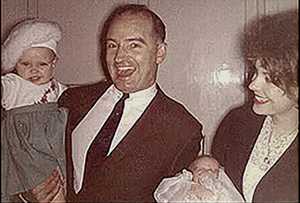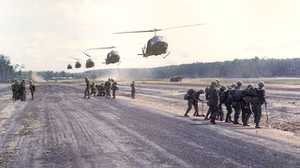He was a general's son, she a beauty queen; by the standards of El Paso, Texas, in the 1960s, theirs was a storybook marriage. But Terry and Jean Allen faced the same stresses many military families experienced when a soldier is called to duty. Their stress was exacerbated by the particular trauma of Vietnam.

A Military Marriage
Terry Allen Jr. wanted to do what his father had done -- a difficult task in his case. Terry Allen Sr. was a well-known World War II general who commanded the celebrated First Infantry Division and appeared on the cover of Time magazine. But mutual bonds of love and pride drew the decorated general and the only child he called "Sonny" together, bonds that guided Terry Jr. through West Point and into a military career. While serving stateside, he met beauty queen Jean Ponder, who also hailed from a well-known El Paso family. At 32, he was 14 years older than she, but neither saw that as a problem -- Terry wanted to be a general, and Jean wanted to be a general's wife. They married in October 1960; Terry had received special permission to return from Germany where he was now stationed. It was a sign of the extent to which the needs of a military career would dominate their marriage.
The Isolation of an Army Wife
Separation was a fact, indeed a requirement, of a military marriage, and in setting out the standards for an army wife, The Officer's Guide placed a premium on the wife "keeping up her end of things" at home while the husband was away. Terry Sr.'s wife, Mary Fran, was a model of this self-sufficiency, but her daughter-in-law found it much more difficult. Stationed in Germany, where she gave birth to three daughters, Jean struggled with postpartum depression and Allen's frequent absences. The feeling of isolation deepened after he was sent to Vietnam in February 1967 -- while Terry relished the opportunity to prove himself in combat, his departure left Jean alone in Texas with three young children. She hosted a weekly television show at a local station, but that experience only led to further alienation.
Growing Doubts
Studies of divorce in the military have shown that a soldier's experience of combat, not just general service, correlates with a substantially higher rate of marital break-ups. And while certain soldiers, like Clark Welch, one of Allen's company commanders, wrote daily loving letters to their wives, Terry seemed to focus too heavily on the operational side of life in country, on experiences Jean found impossible to comprehend. The thought of him dying in Vietnam certainly worried her, but Jean was also being affected by general television images of the war, "women and children and soldiers on both sides being blown up and body parts and blood and body bags and people crying." Her television career also exposed her to antiwar Americans, and she began to doubt not only her marriage but the integrity of the Vietnam conflict. Jean started an affair with a local rodeo clown and wrote a "Dear John" letter to Terry telling him the marriage was over.
Emergency Leave
In June 1967 Allen came home on emergency leave in an unsuccessful effort to save his marriage. He confided to Jean that his own perspective was shifting, and he no longer wanted to be a general. But she told him the marriage was over. When it came time for Terry to leave, his oldest child, a five-year-old named Consuelo, begged him not to go. "I think you're going to die," she said. Consuelo was right; Terry Allen Jr. died on October 17, shot in a Viet Cong ambush while clutching a photo of his three little girls. In the sort of cruel irony that afflicted military families, Consuelo thought the officer in uniform who came to deliver that terrible news was in fact her father, and ran joyfully out to meet him.
A Wife's Conclusions
As for Jean, she would come to regret many of actions during that time, but not her feelings about Vietnam. Whatever else she could or should have done differently, she felt the war was still wrong.







